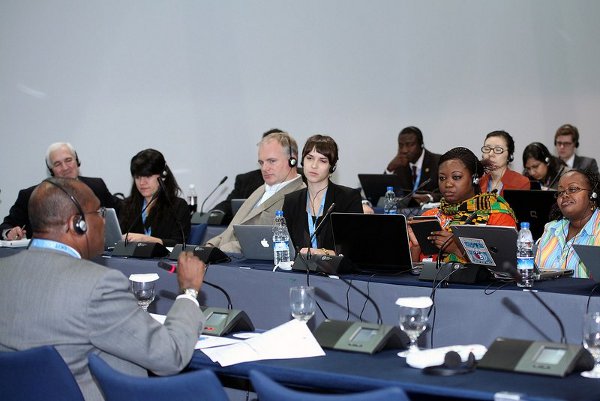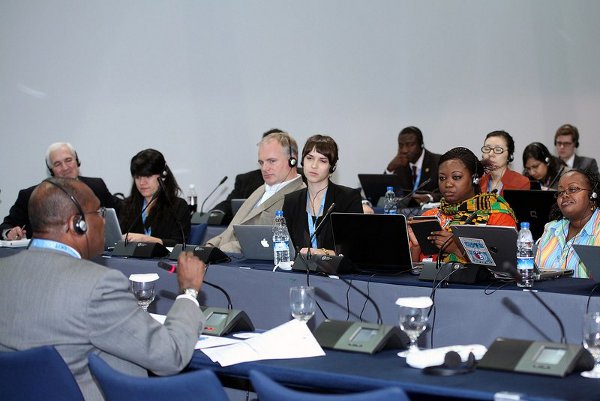The 12-day World Conference on International Telecommunications (WCIT) being held in Dubai has some proponents of a so-called free Internet worried, but news this morning virtually assures their fears were unfounded. A draft yesterday of a proposal that basically derails efforts by Russia and China to regulate the Internet, tells of a watered down compromise to suit the US and the rest of the West.
Some 150 countries are in attendance at this “closed door” conference, one which technically could extend the mission of the United Nations onto governing the web. While Russia, China, and some others seem intent on extending the powers of the ITU, America and most European players are seeking to limit said oversight powers. Criticism from the US is in fact so strong, Congress voted unanimously against ITU control of the Internet. The European Parliament approved a similar resolution earlier as well.
Agreeing to Disagree
 Courtesy WCIT 2012
Courtesy WCIT 2012It is interesting to note here, while many reports hint at the United Nations and the ITU seeking “control” of the web, nowhere, in no document, has any such suggestion been made. Companies such as Google, which went so far as to create a website aimed at opposing ITU control, and other opponents, are vehement in their rhetoric and apparent lobbying.
Coming into focus at this ITU conference, is that agency’s decades old treaty for loosely governing such things as definitions, priorities, safety, and so on where telecommunications is concerned. This WCIT 2012 “congress”, while onerous for opponents, may actually be long overdue. The ten International Telecommunication Regulations (ITRs) at the core of the convention having been set in place before there was real web, or a Google for that matter. But if the most liberal “free web” activists have their say here, even the age of the ITU is being leveraged to sway Generation Y to be suspicious and fearful. At least Machiavelli would have suspected as much here.
The head of ITU, Dr. Hamadoun Touré, said previously no new treaty would be signed without all countries being in agreement. Already Russia has withdrawn their proposal that every country be given the right to manage the Internet. CNET linked to a leaked document (PDF) from ITU, the White House voicing concerns over possible increased censorship, the aforementioned congressional and parliamentary votes, even an organized opposition dubbed “whatistheitu.org” synthesized into yet another website – the video below portraying the evils of the ITU meetings.
If the news from Reuters and other sources in Dubai reflect the tone of these meetings correctly, it seems a foregone conclusion the countries there will water down any intended Internet oversight mechanism. The message from opponents on the web like the sponsors of “whatistheitu.org”, Fight for the Future and accessnow, is encapsulated in their own dogma:
- We love the internet.
- The internet is in danger.
- This must be stopped. (the ITU?)
Freedom’s Just Another Word for…
I could not leave off with this report without taking note of several things which would fly in anyone’s face if they looked slightly deeper into the motivations behind such polarized opinions.
One thing I noted just studying accessnow.0rg is that their advisory board his laden with interests aligned with Google, Facebook, even Craigslist, many vested interests if you get right down to brass tacks. Accessnow.org’s President Andrew McLaughlin was Google’s Director of Global Public Policy, Google’s VP and Chief Internet Evangelist Vint Cerf is an adviser, Facebook’s Chris Hughes, Craigslist’s Craig Newmark, even President Obama’s Chief of Digital Strategy Joe Rospars, all these and more play some kind of role in “organizing citizens from around the world to protect the internet’s openness.”
As for Fight for the Future, all that can be said for vested interests aimed at fighting any ITU regulation is that ultra-liberalization of the web-waves is the goal there. Co-founder Holmes Wilson and his organization are trying to stop regulators from creating new piracy laws that will “disrupt” the Internet. FFTF’s other co-founder, Tiffiniy Cheng, is spotlighted in this Boston Globe article fighting for Google and Wikipedia over previous legislative efforts to curb copyright piracy. This is not to suggest these innovators are any less altruistic in their aims, but even altruism can be misguided by other forces, and often is. Fight for the Future has made huge inroads into stopping censorship, derailing human rights atrocities even, but like Greenpeace and other humanitarian efforts, credibility can be lost in the method. It must also be said, one of the key issues FFTF and accessnow.org have engaged upon is the inaccessibility for groups outside ITU invites. On the PR side, this does not bode well for WCIT 2012.
The World Conference on International Telecommunications (WCIT) 2012 winds up on Friday. In the video interview below from the WCIT, Dr. Hamadoun I. Touré, actually addresses many of the concerns being voiced on both sides of the table. Most notably, the TU Secretary-General makes indelibly clear these meetings are about “discussion” as much as anything else. As we are seeing already, Russia and China sit at one end of the spectrum, while those apparently in favor of all out deregulation of the web are at the other.
For some people, the fighting over net freedom seems to be as much about “who” controls. Is the opposition to a new ITU scope about preventing one more regulatory body only? My last thought is, “sometimes differences of opinion revolve around who has the most to lose, who has the most at stake.” That said, we should all evaluate “exactly” what is being argued, rather then rely on sound bytes to make our decisions for us.
We’ll keep this story updated accordingly.





